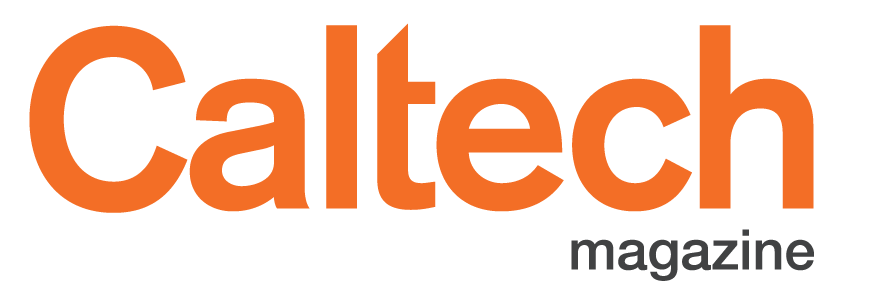A Stroke of Inspiration: Caltech Swim and Dive Head Coach Andy Brabson
Coach Brabson beneath the board of school records. Photo: Caltech Athletics.
by Andrew Moseman
This is the second in a series of stories about inspiring Caltech coaches. See our previous profile of women’s volleyball coach Tom Gardner.
Andy Brabson arrives a few minutes late to our interview but for good reason. The Caltech men’s and women’s swimming and diving coach has spent much of this summer afternoon standing on a ladder, manually updating the big board above the Alumni Pool that displays school records. This day, he posted 25 new record times and scores from the previous year—not that he minds the labor.
It wasn’t so long ago that the pool beneath that board was silent. Toward the end of a successful 2019–20 swimming and diving campaign for Caltech, the sudden arrival of the COVID-19 pandemic caused the season-concluding NCAA national championships to be canceled and wiped out the 2020–21 season. But Caltech dove back in the water strong, with seven swimmers and divers advancing to the postseason national championships in 2021–22, another record for Caltech.
“A big reason why we were really successful this year was the team culture—finding people that were motivated both in the pool and in the classroom,” Brabson says. “This is an individual sport, but at the college level, it's a lot more of a team concept. It’s about people who wanted to be part of that and had a lot of energy to put into something that was larger than themselves. That is always something that I'm looking for in anyone that's going to be joining our team.”
Caltech Athletics director Betsy Mitchell says Brabson has quickly catapulted the program into national recognition.
“Andy Brabson is the quintessential college coach,” she says. “He has followed closely in the footsteps of his college coach at Denison, a Division III powerhouse, and quickly stood on the shoulders of those who came here before him to catapult our program into national recognition. He truly cares about his student athletes, helping them in their goal-setting process, inspiring them, helping them, but also allowing the experience to be theirs—no ego involved!”
Brabson was born a coach. He started at age 15 with a summer league team, and during his own years as a college swimmer, he devised off-season workouts for himself and his teammates. When he got into coaching as a profession, he hoped to work at a small academic-focused school in Southern California so he could coach outside year-round with the mountains perched in the distance. Caltech was a match made in sunshine.
Even so, he had to make an adjustment to the Caltech brand of student-athlete. While there was no need to schedule mandatory study hall sessions to ensure players take academics seriously, Brabson works with his student-athletes on being intentional about how they find balance in their lives.
“I think the type of student and student-athlete that comes to Caltech wants to be involved in everything,” he says. “A lot of what I try to help them learn through being on the team is that, in life, you're going to have to prioritize different things. Obviously, your academics, your mental health, your families are going to come first, but outside of that, you can't take on 10 things and do them at a very high level. If they have high goals and aspirations, I guide them to how they get to those via what they're doing in the pool. A lot of it's just learning time management, prioritizing, and communication.”
Swimmer Nathan McAlister. Photo: Caltech Athletics.
The approach resonated with rising senior Nathan McAlister, who swims longer endurance races such as the 400-yard individual medley. “At Caltech, being an athletic coach is difficult because your student-athletes really have to focus on being students first, and so it's hard to look at your swimmers purely through the athletic lens,” he says. “Andy does a really good job of making sure everyone's still striking that balance, and that's something that I've really appreciated.”
Brabson describes Caltech swimmers and divers as innately curious—the type who want to understand how everything works, including his coaching techniques. Brabson describes his approach as a hybrid of old- and new-school ways to coach swimming: the traditional focus on long-distance swimming to build stamina and the more modern approach of prioritizing shorter, more intense bursts to build up pace and speed. He also coaches swimmers to help them improve individual parts of a race in which they might struggle.
“For example, in a 200-yard race, a lot of people have a tough time on their ‘third 50’ [the third out of four 50-yard segments that comprise the event],” Brabson says. “So, we do a lot in practice where we're mirroring those types of situations and repeating them, getting the athletes used to how to pace those races, getting their bodies conditioned to be able to handle the optimal speed that they want to be hitting at the end of the season.”
The hard work in practice came to fruition in the 2021–22 season. Caltech saw its first women's team member become an individual All-American—Catherine Deng, in the 100-yard butterfly—while Pierre Zeineddin was an individual All-American on the men's side in the 200-yard butterfly. The Caltech men’s 800-yard freestyle relay team of Leo Yang, Chris Pukszta, Max Oberg, and Naci Keskin were named honorable mention All-Americans by finishing 12th at NCAAs in that event. All seven of the team’s national qualifiers were also first-team Academic All-Americans, with the women's team posting the highest fall-term GPA— regardless of division—of any swim and dive program in the country. The men tied for that honor in the winter term.
“They crushed it in both the pool and the classroom,” Brabson says.


